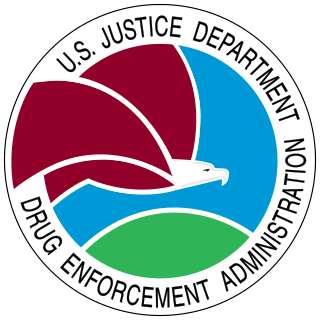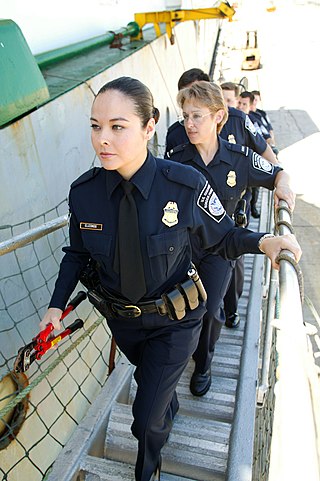
The Drug Enforcement Administration (DEA) is a United States federal law enforcement agency under the U.S. Department of Justice tasked with combating illicit drug trafficking and distribution within the U.S. It is the lead agency for domestic enforcement of the Controlled Substances Act, sharing concurrent jurisdiction with the Federal Bureau of Investigation, the U.S. Immigration and Customs Enforcement, and U.S. Customs and Border Protection. However, the DEA has sole responsibility for coordinating and pursuing U.S. drug investigations both domestically and internationally.

A coast guard or coastguard is a maritime security organization of a particular country. The term embraces wide range of responsibilities in different countries, from being a heavily armed military force with customs and security duties to being a volunteer organization tasked with search and rescue without law enforcement authority. In most countries, a typical coast guard's functions are distinct from those of the navy and the transit police, while in certain countries they have similarities to both.

The Oregon Liquor and Cannabis Commission (OLCC), formerly known as the Oregon Liquor Control Commission, is a government agency of the U.S. state of Oregon. The OLCC was created by an act of the Oregon Legislative Assembly in 1933, days after the repeal of prohibition, as a means of providing control over the distribution, sales and consumption of alcoholic beverages. To this end, the agency was given the authority to regulate and license those who manufacture, sell or serve alcohol. Oregon is one of 18 alcoholic beverage control states that directly control the sales of alcoholic beverages in the United States. In 2014, the passage of Oregon Ballot Measure 91 (2014) legalized the recreational use of marijuana in Oregon and gave regulatory authority to the OLCC.

The Alaska State Troopers, officially the Division of Alaska State Troopers (AST), is the state police agency of the U.S. state of Alaska. It is a division of the Alaska Department of Public Safety (DPS). The AST is a full-service law enforcement agency that handles both traffic and criminal law enforcement. The AST is also involved in apprehending fugitives as part of the Alaska Fugitive Task Force, an inter-agency collaborative of Alaska police departments that cooperates with police agencies throughout the United States and less commonly with Interpol in apprehending wanted men and women. Unlike many lower 48 states, the AST also serves as Alaska’s primary environmental law enforcement agency; troopers assigned to the AST’s Division of Alaska Wildlife Troopers are known as "Alaska Wildlife Troopers" and primarily serve as game wardens, although they retain the same powers as other Alaskan state troopers.

The Texas Alcoholic Beverage Commission, or TABC, is a Texas public agency responsible for regulating, inspecting, and taxing the production, sale, and use of alcoholic beverages within the state. The agency was established in 1935 and is headquartered in Austin.

The Campaign Against Marijuana Planting (CAMP) is a multi-agency law enforcement task force managed by the California Department of Justice and composed of local, state and federal agencies organized expressly to eradicate illegal cannabis cultivation and trafficking in California. Since its establishment in 1983, more than 110 agencies having participated, making CAMP one of the largest law enforcement task force in the United States.

A border guard of a country is a national security agency that performs border security. Some of the national border guard agencies also perform coast guard and rescue service duties.
Law enforcement in Indonesia is mainly performed by the Indonesian National Police (POLRI), together with other law enforcement agencies which are under the president, a certain ministry or State-owned company (BUMN) which perform policing duties for a certain public service, these law enforcement agencies are under supervision and are trained by the Indonesian National Police. The Indonesian National Police is basically the national civilian police force of the country responsible for enforcing law and order of the state.

The Organized Crime Drug Enforcement Task Force (OCDETF) is a federal drug enforcement program in the United States, overseen by the Attorney General and the Department of Justice. The principal mission of the OCDETF program is to identify, disrupt, and dismantle the major drug trafficking operations and tackle related crimes, such as money laundering, tax and weapon violations, and violent crime, and prosecute those primarily responsible for the nation's drug supply.

The Idaho State Police (ISP) is the statewide law enforcement agency for the State of Idaho. It began as the Bureau of Constabulary, created on May 18, 1919, under the new Department of Law Enforcement, to detect and investigate crime, "order abatement of public nuisances and to enforce such orders by appropriate court action, to suppress riots, prevent wrongs to children and animals that are inhibited by law." The state constabulary was also charged with the organization of various state, county and municipal peace officers. The bureau was dissolved by the state legislature in 1923.

The Georgia State Patrol (GSP) was established in March 1937 in the U.S. state of Georgia and is a division of the Georgia Department of Public Safety. It is the primary state patrol agency for the U.S. state of Georgia. Although focused primarily on the enforcement of traffic laws and investigation of traffic crashes, the Georgia State Patrol (GSP) supports the efforts of all public safety agencies to reduce criminal activity, apprehend those involved, and respond to natural and manmade disasters.

The Tennessee Highway Patrol (THP) is the State Patrol organization for the U.S. state of Tennessee, responsible for enforcing all federal and state laws relating to traffic on the state's federal and state highways. The agency was created to protect the lives, property, and constitutional rights of people in Tennessee. The THP is a division of the Tennessee Department of Safety and Homeland Security.

The federal government of the United States empowers a wide range of federal law enforcement agencies to maintain law and public order related to matters affecting the country as a whole.
Operation Green Sweep was a series of drug raids conducted by over 200 United States Army soldiers, National Guardsmen, and federal agents in Humboldt County, California. The operation was the first time active-duty troops were used to combat marijuana growing in the United States. The joint federal and state operation led by the Bureau of Land Management was centered around eradicating marijuana and removing agribusiness paraphernalia from the King Range National Conservation Area, federal land administered by BLM near Petrolia, California.

In the United States, the state police is a police body unique to each U.S. state, having statewide authority to conduct law enforcement activities and criminal investigations. In general, state police officers or highway patrol officers, known as state troopers, perform functions that do not fall within the jurisdiction of a county’s sheriff, such as enforcing traffic laws on state highways and interstates, overseeing security of state capitol complexes, protecting governors, training new officers for local police forces too small to operate an academy and providing technological and scientific services. They also support local police and help to coordinate multi-jurisdictional task force activity in serious or complicated cases in states that grant full police powers statewide.
The South Carolina Law Enforcement Division (SLED) is a statewide investigative law enforcement agency in South Carolina. SLED provides manpower and technical assistance to other law enforcement agencies and conducts investigations on behalf of the state as directed by the Governor and Attorney General. SLED Headquarters is located in the state capital, Columbia, with offices in the Midlands, Piedmont, Pee Dee, and Low Country regions.

Cannabis in Tennessee is illegal for most use, with the exception of limited medical purposes. Possession of even small amounts is a criminal misdemeanor, but there are limited legal allowances for non-psychoactive CBD oil as medical cannabis, and the authorities have not been able to enforce the law.
The Kentucky Marijuana Strike Force, also known as the Kentucky Governor's Marijuana Strike/Task Force, is a multi-agency law enforcement task force managed by the Office of the Governor of Kentucky and Kentucky State Police Marijuana Suppression Branch, and composed of local, state and federal agencies organized expressly to eradicate illegal cannabis cultivation and trafficking in Kentucky. The task force was established in 1990, to combat marijuana cultivation on public lands in Kentucky that ranks third in the United States, behind California and Tennessee. An estimated $1 billion worth of marijuana is seized in Kentucky annually.
Florida's Domestic Marijuana Eradication Program, is a multi-agency state and federal law enforcement program founded in 1981, jointly managed by the Drug Enforcement Administration and the Florida Department of Agriculture and Consumer Services to provide funding for local law enforcement agencies’ efforts to eradicate illegal cannabis cultivation and trafficking in Florida.













